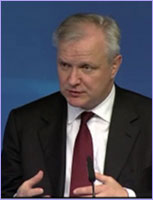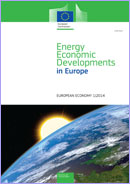|
|
|
|
|
|
 |
 |
 |
 |
Spain’s financial sector programme draws to a successful conclusion
Spain’s financial sector programme formally drew to a successful conclusion on 22 January after 18 months. According to Commission Vice-President Olli Rehn, the programme has achieved its twin objectives of repairing and reforming the Spanish financial sector, and in so doing, has helped to create a sound basis for the economic recovery. Spanish financial markets have stabilised, banks have increased liquidity, their solvency position remains comfortable, deposits are rising, access to funding markets is improving, and the restructuring of banks is well underway. Moreover, the governance, regulatory and supervisory framework of the banking sector has been significantly strengthened, so as to ensure that the irresponsible practices which led to the crisis in the first place will not be repeated. Rehn emphasises that the challenges facing Spain remain considerable, however, and structural reforms, fiscal consolidation and efforts to reduce the dramatically high unemployment rate must continue. His views were shared by Eurogroup finance ministers on 27 January who discussed the main findings of the fifth and final review of the financial sector programme. In response to its request of 25 June 2012, Spain received financial assistance of EUR 41.3 billion from euro area Member States via the European Financial Stability Facility (EFSF). The assistance was subsequently taken over by the European Stability Mechanism (ESM).
|
 |
 |
 |
|
 |
 |
 |
 |
 |
|
 |
 |
 |
| ...we can conclude that the programme has worked. Thanks to the Spanish authorities’ determined efforts and the support and solidarity of the euro area Member States, confidence in the Spanish economy has returned, and justifiably so. |
 |
Olli Rehn, Vice-President for Economic and Monetary Affairs and the Euro
|
|
|
|
 |
 |
 |
 |
Council opens excessive deficit procedure for Croatia
EU finance ministers agreed to open an excessive deficit procedure for Croatia on 28 January, both recognising the existence of an excessive government deficit and setting out measures to be taken to correct the deficit by 2016. The Council concurred with the Commission’s view that Croatia does not meet the EU’s deficit and debt criteria. According to data provided by the Croatian authorities, Croatia’s government deficit for 2013 was significantly above the EU’s 3% of GDP reference value and is set to increase in 2014 and 2015. The Commission’s 2013 autumn forecast projects the deficit to rise to above 6% of GDP in the 2013-2015 period, if corrective measures are not taken. The Council has set a deadline of 30 April 2014 for Croatia to take effective action and to report in detail on the consolidation strategy it envisages in order to achieve its targets.
|
 |
|
 |
 |
|
 |
 |
 |
 |
Commission proposes new rules to contain risky proprietary trading by banks
The European Commission has proposed new rules to stop the biggest and most complex banks from engaging in risky proprietary trading. The new rules announced on 29 January would also give supervisors the power to require the banks to separate certain potentially risky trading activities from their deposit-taking business, if the pursuit of such activities compromises financial stability. To prevent banks from attempting to circumvent these rules by shifting parts of their activities to the less-regulated shadow banking sector, the Commission has also adopted measures aimed at increasing the transparency of certain transactions in the shadow banking sector. These measures complement the overarching reforms already undertaken to strengthen the EU financial sector.
|
 |
|
 |
 |
|
 |
 |
 |
 |
To become more competitive Europe needs to boost internal and external trade, Barroso says at World Economic Forum
Commission President Manuel Barroso participated in a panel discussion on “Closing Europe’s Competitiveness Gap” at the World Economic Forum in Davos, Switzerland on 23 January. Barroso said that “business as usual will not be possible” because Europe must improve its competitiveness, but he added that Europe does not have an overall competitiveness problem, only specific competitiveness problems. Barroso maintained that trade has delivered prosperity to the EU which has been a big player for decades. Barroso emphasised trade – both internal and external – as an important lever for boosting competitiveness. Neelie Kroes, Vice-President of the European Commission responsible for the Digital Agenda, also attended the conference. She delivered a speech in which she emphasised the power of the internet as a force for revitalising the European economy.
|
 |
|
 |
 |
|
 |
 |
 |
 |
EU-US trade negotiations: EU aims to establish framework for regulatory cooperation on financial services
The EU has proposed establishing a framework for regulatory cooperation on financial services in the Transatlantic Trade and Investment Partnership (TTIP) that it is currently negotiating with the US. The goal is not to define the substance of international standards, but to create an institutional framework for regulatory cooperation. This would ensure that EU and US rules work together to achieve equivalent outcomes – without creating barriers to trade – and it would help to prevent future crises. Following unprecedented public interest in the talks, the Commission on 21 January decided to closely consult with the public on investment provisions of the TTIP with an eye to eliminating loopholes that could be exploited by companies. On 27 January, the Commission also launched a special Advisory Group of experts that it will consult throughout the negotiations. The experts represent a broad range of interests, from environmental, health, consumer and workers’ interests to different business sectors.
|
 |
|
 |
 |
|
 |
 |
 |
 |
Commission calls for immediate action for a European industrial renaissance
The European Commission has called for immediate action to stimulate a European industrial renaissance. In a Communication adopted on 22 January and entitled For a European Industrial Renaissance, the Commission urges Member States to recognise the central importance of industry for creating jobs and growth, and to mainstream industry-related competitiveness concerns across all policy areas. It also calls on the Council and the Parliament to adopt proposals on energy, transport, space and digital communications networks as well as to implement and enforce legislation to complete the internal market. According to the Commission, industrial modernisation must also be pursued by investing in innovation, resource efficiency, new technologies, skills and access to finance, accelerated by the use of dedicated EU funds. Enhancing industrial competitiveness is vital for re-launching growth and employment. The Commission’s goal is to increase manufacturing’s share of GDP to 20% by 2020 from its current level of approximately 15%.
|
 |
|
 |
 |
|
 |
 |
 |
 |
Euro area annual inflation down to 0.8%, EU stable at 1.0%
Euro area annual inflation was 0.8% in December 2013, down from 0.9% in November. A year earlier the rate was 2.2%. EU annual inflation was 1.0% in December 2013, stable compared with November. A year earlier the rate was 2.3%. These figures come from Eurostat, the statistical office of the European Union. In December 2013, the lowest annual rates were observed in Greece (-1.8%), Cyprus (-1.3%), Bulgaria (-0.9%) and Latvia (-0.4%), and the highest in Estonia, Austria and the United Kingdom (all 2.0%) and Finland (1.9%). Compared with November 2013, annual inflation fell in nine Member States, remained stable in four and rose in fourteen. The lowest 12-month average rates up to December 2013 were registered in Greece (-0.9%), Latvia (0.0%), Bulgaria, Cyprus, Portugal and Sweden (all 0.4%), and the highest in Estonia and Romania (both 3.2%), the Netherlands and the United Kingdom (both 2.6%).
|
 |
|
 |
 |
|
 |
 |
 |
 |
Switch to new accounting standard will increase EU GDP figures by around 2.4 percent
EU annual gross domestic product (GDP) figures will be revised upwards by around 2.4 % when the EU switches to a new accounting standard in September 2014, Eurostat, the statistical office of the EU, announced on 16 January. The change per EU country will range from close to zero up to 5%, depending on the individual country. This purely methodological change will be compounded with other changes, notably a regular benchmark revision. The European System of National and Regional Accounts (ESA 2010) replaces ESA 1995. The new standard reflects important changes in the economy over the past 20 years, in particular the increasing role of ICT in production processes, the growing importance of intangible assets including intellectual property, and the globalisation of economic systems. One of the main improvements is that R&D investment will be capitalised rather than treated as a current expenditure. This change accounts for 80% of the increase in GDP. Expenditure on weapon systems will also be capitalised and the transparency and comparability of pension schemes between countries will be enhanced. The switch to ESA 2010 is part of a worldwide move to a new accounting system called System of National Accounts 2008, which was implemented in the United States last August.
|
 |
|
 |
 |
|
 |
 |
 |
 |
Sabine Lautenschläger takes up her position on ECB executive board
Succeeding Jörg Asmussen, on 27 January Ms Sabine Lautenschläger took up her position on the executive board of the European Central Bank (ECB) for a term of eight years. The European Council had agreed on 21 January to her appointment to succeed Jörg Asmussen, whose resignation took effect on 7 January. Until 26 January Ms Lautenschläger was Deputy President of the Deutsche Bundesbank and a member of the Basel Committee on Banking Supervision, and previously served on the Management Board of the European Banking Authority. The executive board of the ECB is responsible for implementation of monetary policy for the euro area, as laid down by the governing council. It is composed of the President, a vice-president and four other members, each nominated for a non-renewable term of eight years.
|
 |
|
 |
 |
|
|
|
 |
 |
 |
 |
Energy Economic Developments in Europe. European Economy 1/2014.
This study assesses developments in different aspects of the EU energy system both at the EU and Member State level, and compares Europe with key international competitors. The study examines the impact of energy costs on competitiveness, the economic impact of energy and climate policies, and developments in the renewables sector. It finds that the EU has made a huge leap forward in promoting the transition to a low-carbon economy. Moreover, the EU manufacturing sector has successfully reduced its energy-intensity. The increasing EU-US energy price gap is cause for concern, however. The study also concludes that while Europe has been successful in developing wind and solar, the carbon price currently fails to provide a strong price signal for consumption behaviour and for investments in clean production technologies.
|
|
 |
|
|
|
|
|
|
|
|
|
|
|
|
|
|
|
 |
| Directorate-General for Economic and Financial Affairs |
 |
|